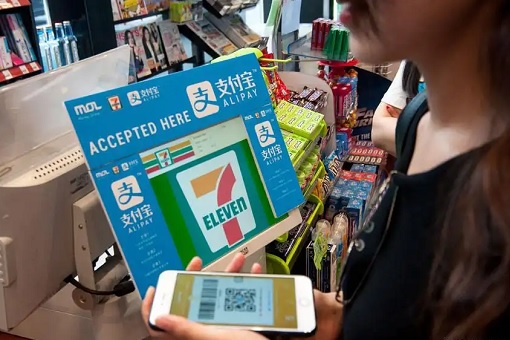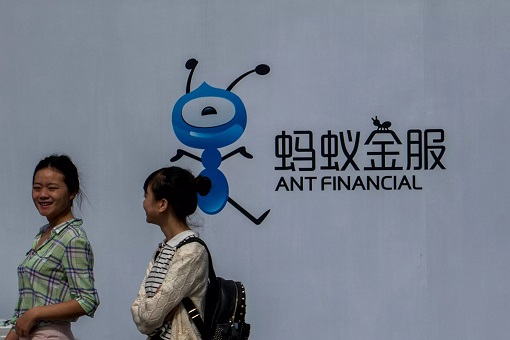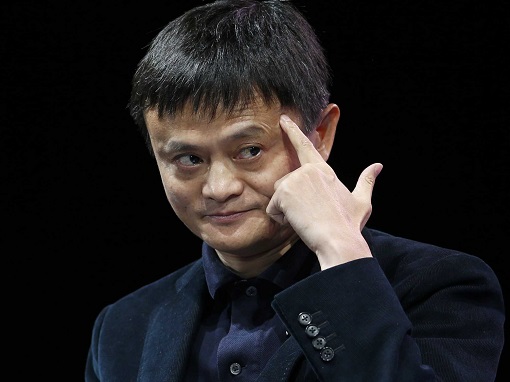From KK Super Mart in Malaysia to South Africa bus ticketing service, one cannot help but notice “Alipay” logo, a sign of how far and fast the Chinese – either tourists or workers – have invaded the globe. The Alipay payment method is now accepted in 70 countries across Asia, Australia, New Zealand, Europe, North America and Africa. But just how huge is Alipay?
Alipay, now known as Ant Financial Services Group, has become the world’s biggest financial-technology firm. It’s founder – billionaire Jack Ma – doesn’t want people to see his cash cow firm as a conventional bank but a technology firm, despite the fact it handled US$8.8 trillion transactions last year, more than MasterCard’s US$5.2 trillion.
In fact, Jack Ma’s firm possessed 620 million online payment active users as compared to PayPal’s 244 million in 2017. In terms of fund size, the Ant Financial’s US$219 billion was bigger than the U.S. JPMorgan Chase’s US$134 billion. The company was so massive that it’s yearly online payments is equivalent to more than twice Germany’s GDP (gross domestic product).

And there’s a reason why Mr. Ma insisted of his giant company being known as a technology firm, and not a banking institution. He doesn’t want his baby to be regulated like a bank. But China’s banks aren’t impressed. They complain that like a vampire, Jack Ma’s Ant is sucking away deposits from brick-and-mortar banks, causing them to close down branches and ATMs.
Zhu Ning, deputy director of the National Institute of Financial Research at Tsinghua University, said – “For years, Chinese authorities turned a blind eye and let them grow as large as they could. It is simply incredible that such a gigantic financial institution has slipped away from a comprehensive regulatory framework.”
Recently, the vice governor of China’s central bank warned that some influential payment institutions should not think of themselves as “too big to be regulated.” Jack Ma, of course, has rubbished that his company is behaving like a bank without oversight. Ant simply says they are just bringing financial services to people the banks have ignored.

Ant’s roots trace to 2004, when Alibaba created Alipay to facilitate online shopping. Alibaba’s version of eBay – Taobao – required a secure and reliable way to send payments. Mr. Ma himself said in December 2008 that China’s banks weren’t doing enough to support small businesses. He pledged – “If the banks do not change, we will change the banks.”
About 10 years later today, Alipay has grown so huge that the giant is threatening the same banks which have been ignoring small firms and businesses. To be fair, it wasn’t a walk in the park for Jack Ma. He was forced to cut out Alipay from Alibaba in 2010 after Chinese authorities said the payment operation would need a new license to operate.
By 2013, Alipay was holding billions of dollars of customer funds in escrow, a custodian bank account, for transactions on Taobao. Like Jeff Bezos of Amazon, Jack Ma’s Ant continues making tons of money as it accumulated piles of cash. Heck, it made so much money that even Ant’s own executives were worried banks would eventually see Alipay as a competitor.

Adding insult to the injury, Alipay hatched the idea of allowing customers to stash their idle Alipay money in an online money-market fund to earn income. The fund – Yu’e Bao – allows Alipay users to invest as little as 0.01 Yuan and to transfer cash in and out without fees. It quickly becomes very popular because the 6% interest returns were higher than what banks were willing to pay.
Last year, Ant Financial revealed that the average consumer invested roughly 3,800 Yuan in the Yu’e Bao fund. Chinese finance regulators have since stepped up restrictions in an effort rein in rapid growth in the country’s online finance sector. By December, 2017, Ant Financial’s money market fund decided to cap the daily amount users can invest at 20,000 Yuan.
Taking advantage of China’s rapid adoption of smartphones, Alipay – rebranded itself as Ant in 2014 – subsequently ventured into personal loans, small-business lending, credit scoring and insurance. The company then kicked off a campaign in the city of Wuhan to promote a “cashless society”, similar to Scandinavia countries such as Sweden, Norway and Denmark have embarked.

However, the China’s central bank wasn’t impressed and ordered Ant to remove the word “cashless” and told store owners not to reject cash. To prevent misuse, the central bank has required non-bank payment operators such as Alipay and its chief rival WeChat Pay (operated by Tencent Holdings Ltd.) to place escrow funds in non-interest-bearing bank accounts by early 2019.
Jack Ma soon realised that there’s a price to pay for growing too big in China. Not only his Ant won’t be able to use escrow money to generate interest gains, the cash cow is also being told to cede control over all its transaction data to a new centralise clearing house – Wang Lian – a government-owned internet payment system. The authorities are also weighing whether to designate Ant a financial holding company.
Other Articles That May Interest You …
- Jack Ma Lectures American Businessmen – “Stop Whining & Bitching About China”
- Robert Kuok – How Chinese Become Amazing Economic Ants Despite Poverty & Discrimination
- Beijing Sends Jack Ma To Befriends Donald Trump, Offering 1-Million Jobs
- Jack Ma Kept Talking “Trust” – Did He Try To Signal He Won’t Scam Your Money?
- Alibaba New Discovery – Women With Bigger Boobs Spend More
- Alibaba Jack Ma Raising Money Via IPO, But This Guy’s Raising Money Via Girlfriend Rental

|
|
July 30th, 2018 by financetwitter
|


|

|

|

|

|

|




























Comments
Add your comment now.
Leave a Reply